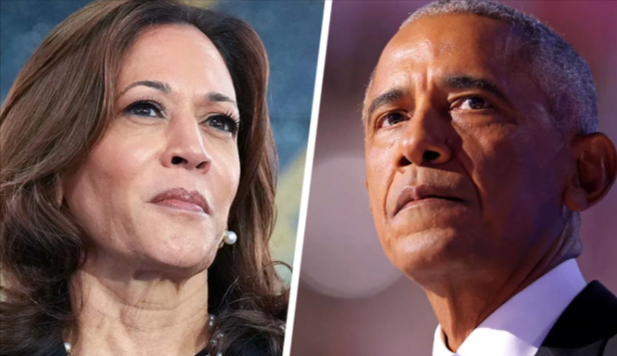‘No Longer His Party’: Dems Search For Answers As Obama’s Influence Wanes

President-elect Donald Trump secured a decisive victory in the 2024 presidential election, defeating Vice President Kamala Harris and, indirectly, former President Barack Obama.
Obama, who was a vocal supporter of Harris throughout her campaign, had framed the election as a battle of character and principles rather than ideas. However, Trump’s resounding win, with a 312 to 226 Electoral College margin, showed voters had made a clear choice. Trump also became the first Republican to win the popular vote by nearly three million votes since George W. Bush in 2004.
This outcome has dealt a significant blow to Obama’s legacy as the de facto leader of the Democratic Party, leaving the party in a weakened position in Washington, D.C., until at least 2026.
Trump’s landslide victory has prompted Democrats to reevaluate their strategy. With the Republican Party already transformed by Trump’s leadership eight years ago, Democrats now face internal calls for fresh leadership and a forward-looking vision, as reported by the Washington Examiner.
Former Obama Homeland Security Secretary Jeh Johnson emphasized the need for Democrats to evolve. “It’s no longer the party of Obama,” Johnson said. “Neither is it the party of Roosevelt or Kennedy anymore. The Republican Party is certainly not the party of Reagan anymore. A good political party knows how to look forward, not backward.”
Democratic strategist Tom Cochran, who previously worked at the Obama State Department, echoed these sentiments. “It’s hard to inspire people with yesterday’s voices when we’re trying to solve tomorrow’s problems,” Cochran told the Washington Examiner. He stressed the importance of addressing the public’s dissatisfaction with the status quo and their desire for significant change.
Cochran added, “The Democrats need new ideas, new voices, and a willingness to listen to and understand America’s collective frustrations.”
Presidential historian David Pietrusza noted that Obama’s influence might be waning. “At some point, even historic figures become yesterday’s news,” he said.
One example of Obama’s diminishing sway came when he faced criticism for remarks about Black male voters during the campaign. Speaking last month, Obama commented, “Based on reports from campaigns and communities, we haven’t seen the same energy and turnout as when I was running. Speaking directly to men, part of me thinks you’re not ready for the idea of a woman as president and are finding other reasons for that.”
Despite this, Democratic strategist Garry South defended Obama, calling him “one of the most compelling voices we have in the party.” South dismissed claims that Obama was to blame for Harris’ loss. “No one can blame him for Harris’ loss—that’s on her. He went above and beyond in campaigning for her, but voters don’t make decisions based on surrogates.”
As Democrats regroup, some party leaders see opportunities for Harris to rebuild her political standing, much like Hillary Clinton, John Kerry, and Al Gore did after their defeats. One Senate Democrat told the Washington Examiner that the party would find new standard-bearers to lead into 2028.
Figures like Johnson have pointed to a cultural disconnect as a key reason for the party’s loss of support among blue-collar voters. He noted that many working-class individuals, regardless of race, oppose progressive social programs like those related to transgender rights and diversity initiatives.
“It’s more cultural than political,” Johnson said. “We’re seen as the party of coastal elites, chardonnay, and political correctness. Perhaps we need to become the party of John Fetterman—embracing hoodies and Crocs.”
Strategist Hahn also dismissed the idea that the party is overly reliant on Obama’s legacy, calling it “more of a conservative meme than a real thing.” He insisted that Democrats need to refocus their efforts on connecting with working-class voters and predicted a robust primary in 2028.